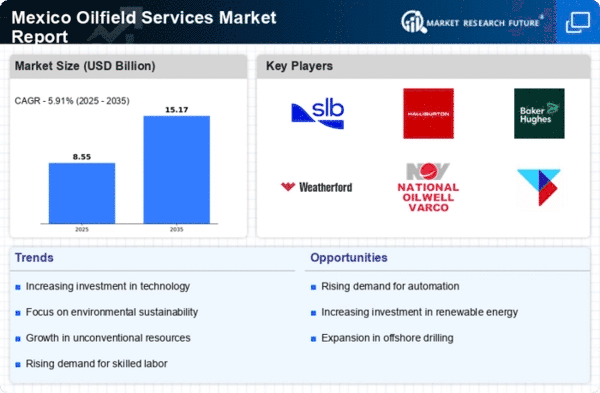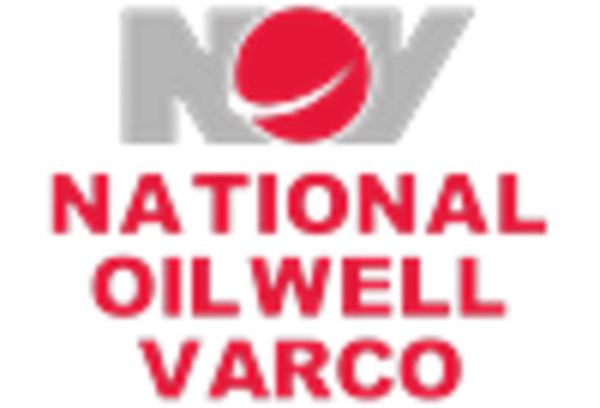Regulatory Reforms
The oilfield services market in Mexico is currently experiencing a wave of regulatory reforms aimed at enhancing operational efficiency and attracting foreign investment. The Mexican government has implemented policies that streamline the permitting process for oil exploration and production activities. This regulatory environment is expected to foster a more competitive landscape, encouraging both domestic and international companies to invest in oilfield services. As a result, the market is projected to grow at a CAGR of approximately 5% over the next five years. These reforms not only aim to increase production levels but also to ensure compliance with environmental standards, thereby promoting sustainable practices within the oilfield services market.
Rising Energy Demand
The increasing energy demand in Mexico is a crucial driver for the oilfield services market. As the country seeks to meet its growing energy needs, the government is focusing on enhancing oil production capabilities. This demand is driven by both industrial growth and population expansion, leading to a projected increase in oil consumption by 3% annually. Consequently, oilfield services are essential for optimizing extraction processes and improving recovery rates. The market is likely to see a surge in demand for drilling, completion, and maintenance services, as companies strive to maximize output and efficiency in response to this rising energy demand.
Foreign Investment Influx
The oilfield services market in Mexico is witnessing a notable influx of foreign investment, driven by the country's strategic location and abundant natural resources. International oil companies are increasingly entering the market, attracted by the potential for high returns on investment. In 2025, foreign direct investment in the oil sector is projected to reach approximately $10 billion, reflecting a growing confidence in Mexico's oil potential. This influx not only brings capital but also advanced technologies and expertise, which are essential for enhancing operational efficiency in the oilfield services market. The collaboration between local and foreign firms is likely to foster innovation and improve service delivery.
Technological Integration
The integration of advanced technologies in the oilfield services market is transforming operational practices in Mexico. Companies are increasingly adopting digital solutions such as data analytics, automation, and artificial intelligence to enhance efficiency and reduce costs. This technological shift is expected to improve decision-making processes and optimize resource allocation. For instance, the use of predictive maintenance can potentially reduce downtime by up to 20%, significantly impacting overall productivity. As these technologies become more prevalent, they are likely to drive innovation and competitiveness within the oilfield services market, enabling firms to respond more effectively to market demands.
Environmental Considerations
Environmental considerations are becoming increasingly prominent in the oilfield services market in Mexico. As global awareness of climate change rises, the Mexican government is emphasizing the need for sustainable practices within the oil industry. This shift is prompting companies to adopt cleaner technologies and reduce their carbon footprint. The market is likely to see a growing demand for services that focus on environmental compliance and sustainability. For instance, investments in carbon capture and storage technologies are expected to increase, potentially leading to a 15% reduction in emissions from oilfield operations. This focus on environmental stewardship is essential for the long-term viability of the oilfield services market.
















